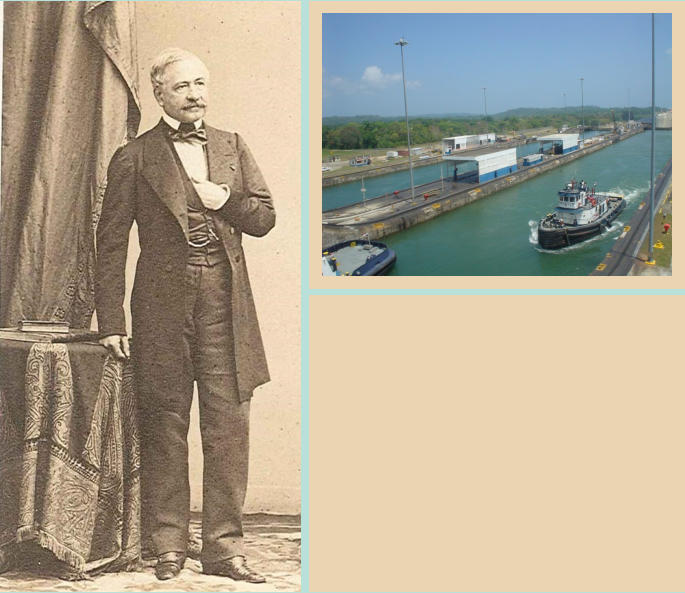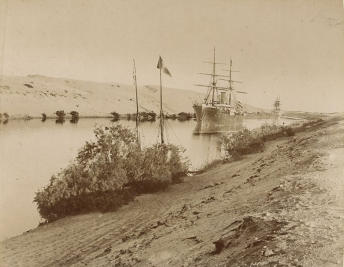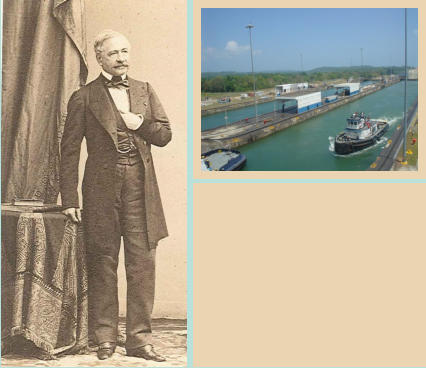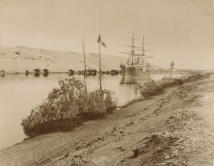“But
when
[Uzziah]
became
strong,
his
heart
was
so
proud
that
he
acted
corruptly,
and
he
was
unfaithful
to
the
Lord
his
God,
for
he
entered
the
temple
of
the Lord to burn incense on the altar of incense” (2 Chronicles 26:16).
“Such a Dangerous Man”
In
1859-69,
the
French
diplomat,
Ferdinand
de
Lesseps,
successfully
directed
the
effort
to
cut
a
100-mile
Suez
Canal
to
join
the
Atlantic
and
Indian
Oceans.
This
made
him
one
of
the
most
lionized
men
of
his
time.
Indeed,
so
great
was
the
confidence
in
him,
that
he
was
appointed
to
undertake
the
construction
of
the
Panama
Canal
to
connect
the
Atlantic
and
Pacific Oceans.
Yet,
the
Isthmus
of
Suez
was
relatively
flat,
making
it
possible
to
dig
a
sea-level
canal
there,
while
the
terrain
of
Panama
was
so
different
that
it
made
it
very
difficult
to
build
a
canal
without
locks
there.
De
Lesseps,
nevertheless,
was
undeterred.
Against
all
the
advice
and
warnings
of
experts,
he
adamantly
insisted
that
the
Panama
Canal
also
be
constructed
at
sea-level.
As
a
result,
the
French
effort
to
build
a
canal
across
Panama
was
a
colossal
failure
and
the
company
created
to
finance
it
went
bankrupt.
After
an
official
inquiry,
the
French
government
sentenced
de
Lesseps
to
a
five-year
imprisonment,
which
he
escaped
only
by
a
successful
appeal.
Of
de
Lesseps
and
this sad episode, historian David McCullough aptly says:
“But
the
crucial
point
is
that
[Ferdinand]
de
Lesseps
was
a
rainmaker
to
the
nineteenth
century:
he
himself
was
no
less
bedazzled
than
anyone
by
that
era’s
own
new
magical
powers.
…
It
was
he
who
had,
at
Suez,
succeeded
in
bringing
science
and
technology
to
bear
for
one
noble,
humanitarian
purpose;
and
after
that
it
had
been
very
difficult
to
doubt
his
word
or
distrust
his
vision.
From
Suez
on,
as
he
himself
once
said,
he
enjoyed
‘the
privilege
of
being
believed
without
having
to
prove
what
one
affirms.’
It
was
this
that
made
him
such
a
popular
force
and
such a dangerous man” (The Path Between the Seas, pp. 238, 239).
Benjamin
Franklin
said,
“Success
has
ruined
many
a
man.”
That
was
obviously
true
of
Ferdinand
de
Lesseps.
Success
in
Suez
ensured
his
failure
at
Panama.
This
is
understandable.
Men
are
naturally
prone
to
trust
themselves
and
all
the
more
so
when
others
affirm
their
self-worth.
Yet,
the
desire
for
the
approval
of
others
can
also
restrain
them
from
the
foolishness
to
which
their
egos
would
otherwise
drive
them.
After
all,
success,
and
the
support
for
one’s
self-image
derived
from
it,
often
depends
on
the
assistance
of
others.
In
fact,
the
success
which
so
inflated
de
Lesseps’
ego
consists
just
as
much
in
the
popular
acclaim
as
in
the
achievement
which
brings
it.
De
Lesseps
could
not
have
ruined
himself
and
others
had
he
not
had
their
assistance.
Their
unstinting
praise
and
conferral
of
infallibility
upon
him
enabled
him
to
overlook
obvious
problems
with
his
plan.
Thus,
he
could
not
have
been
as
much
a
failure
as
he
had
been
a
success
without
the
cooperation
of
thousands,
if
not
millions,
of
others.
He
became
“such
a
dangerous
man”
because
his
admirers
made
him
so.
So,
in
the
end,
it
was
not
de
Lesseps
who
was
the
greater
danger;
it
was
those
who
were
willing
to
elevate
him
to
danger.
His
big
mistake
lay
in
yielding
to
the
overwhelming
temptation
to
trust
the
masses,
who
trusted
him
to
trust
their
judgment
of
him
and
his
abilities.
To
that
extent,
they were the dangerous ones.
The
same
remains
true
today,
especially
in
the
religious
realm,
where
people
lack
the
feedback
of
physical
failure
to
hold
the
adulation
of
themselves
and
others
in
check.
All
they
have
there
is
the
Bible,
though
without
the
faith
to
trust
unquestioningly
in
it
as
God’s
infallible
word
rather
than
in
popular
judgment,
often
based
on
observation
of
circumstances,
it
does
no
good.
Anytime
anyone
allows
himself
to
be
elevated
by
the
acclaim
of
the
masses
to
practical
infallibility,
he
becomes
“such
a
dangerous
man.”
Yet,
he
can
only
be
dangerous
because
the
masses
have
made
him
so.
It
is
always
Man
who
is
the
most
dangerous man.
Copyright © 2017 - current year, Gary P. and Leslie G. Eubanks. All Rights Reserved.



Clockwise left to right: Ferdinand de Lesseps/Panama Canal/Suez Canal
Copyright © 2017 - current year, Gary P. and Leslie G. Eubanks. All Rights Reserved.
“But
when
[Uzziah]
became
strong,
his
heart
was
so
proud
that
he
acted
corruptly,
and
he
was
unfaithful
to
the
Lord
his
God,
for
he
entered
the
temple
of
the
Lord
to
burn
incense on the altar of incense” (2 Chronicles 26:16).
“Such a Dangerous Man”
In
1859-69,
the
French
diplomat,
Ferdinand
de
Lesseps,
successfully
directed
the
effort
to
cut
a
100-mile
Suez
Canal
to
join
the
Atlantic
and
Indian
Oceans.
This
made
him
one
of
the
most
lionized
men
of
his
time.
Indeed,
so
great
was
the
confidence
in
him,
that
he
was
appointed
to
undertake
the
construction
of
the
Panama
Canal
to
connect the Atlantic and Pacific Oceans.
Yet,
the
Isthmus
of
Suez
was
relatively
flat,
making
it
possible
to
dig
a
sea-level
canal
there,
while
the
terrain
of
Panama
was
so
different
that
it
made
it
very
difficult
to
build
a
canal
without
locks
there.
De
Lesseps,
nevertheless,
was
undeterred.
Against
all
the
advice
and
warnings
of
experts,
he
adamantly
insisted
that
the
Panama
Canal
also
be
constructed
at
sea-level.
As
a
result,
the
French
effort
to
build
a
canal
across
Panama
was
a
colossal
failure
and
the
company
created
to
finance
it
went
bankrupt.
After
an
official
inquiry,
the
French
government
sentenced
de
Lesseps
to
a
five-year
imprisonment,
which
he
escaped
only
by
a
successful
appeal.
Of
de
Lesseps
and
this
sad
episode,
historian
David
McCullough aptly says:
“But
the
crucial
point
is
that
[Ferdinand]
de
Lesseps
was
a
rainmaker
to
the
nineteenth
century:
he
himself
was
no
less
bedazzled
than
anyone
by
that
era’s
own
new
magical
powers.
…
It
was
he
who
had,
at
Suez,
succeeded
in
bringing
science
and
technology
to
bear
for
one
noble,
humanitarian
purpose;
and
after
that
it
had
been
very
difficult
to
doubt
his
word
or
distrust
his
vision.
From
Suez
on,
as
he
himself
once
said,
he
enjoyed
‘the
privilege
of
being
believed
without
having
to
prove
what
one
affirms.’
It
was
this
that
made
him
such
a
popular
force
and
such
a
dangerous
man”
(The
Path
Between
the
Seas,
pp. 238, 239).
Benjamin
Franklin
said,
“Success
has
ruined
many
a
man.”
That
was
obviously
true
of
Ferdinand
de
Lesseps.
Success
in
Suez
ensured
his
failure
at
Panama.
This
is
understandable.
Men
are
naturally
prone
to
trust
themselves
and
all
the
more
so
when
others
affirm
their
self-
worth.
Yet,
the
desire
for
the
approval
of
others
can
also
restrain
them
from
the
foolishness
to
which
their
egos
would
otherwise
drive
them.
After
all,
success,
and
the
support
for
one’s
self-image
derived
from
it,
often
depends
on
the
assistance
of
others.
In
fact,
the
success
which
so
inflated
de
Lesseps’
ego
consists
just
as
much
in
the
popular
acclaim
as
in
the
achievement
which
brings
it.
De
Lesseps
could
not
have
ruined
himself
and
others
had
he
not
had
their
assistance.
Their
unstinting
praise
and
conferral
of
infallibility
upon
him
enabled
him
to
overlook
obvious
problems
with
his
plan.
Thus,
he
could
not
have
been
as
much
a
failure
as
he
had
been
a
success
without
the
cooperation
of
thousands,
if
not
millions,
of
others.
He
became
“such
a
dangerous
man”
because
his
admirers
made
him
so.
So,
in
the
end,
it
was
not
de
Lesseps
who
was
the
greater
danger;
it
was
those
who
were
willing
to
elevate
him
to
danger.
His
big
mistake
lay
in
yielding
to
the
overwhelming
temptation
to
trust
the
masses,
who
trusted
him
to
trust
their
judgment
of
him
and
his
abilities.
To
that
extent,
they
were
the
dangerous ones.
The
same
remains
true
today,
especially
in
the
religious
realm,
where
people
lack
the
feedback
of
physical
failure
to
hold
the
adulation
of
themselves
and
others
in
check.
All
they
have
there
is
the
Bible,
though
without
the
faith
to
trust
unquestioningly
in
it
as
God’s
infallible
word
rather
than
in
popular
judgment,
often
based
on
observation
of
circumstances,
it
does
no
good.
Anytime
anyone
allows
himself
to
be
elevated
by
the
acclaim
of
the
masses
to
practical
infallibility,
he
becomes
“such
a
dangerous
man.”
Yet,
he
can
only
be
dangerous
because
the
masses
have
made
him
so.
It
is
always Man who is the most dangerous man.

Clockwise left to right: Ferdinand de Lesseps/Panama Canal/Suez Canal













